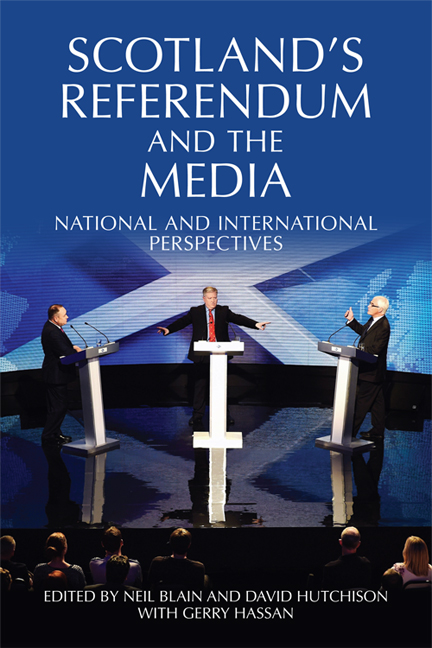Book contents
- Frontmatter
- Contents
- Preface
- Part One The Referendum in Scotland
- Part Two Views from the UK
- Part Three International Perspectives
- 13 ‘Knock-on Consequences’: Irish Media Coverage of the Scottish Referendum
- 14 Spain, Catalonia and the Scottish Referendum: A Study in Multiple Realities
- 15 The French View
- 16 The Scottish Referendum in Austrian, German and Swiss Media
- 17 The Scottish Referendum: The View from Quebec
- 18 The Scotland Referendum in the English-language Canadian Media
- 19 Australia and the Scottish Independence Referendum
- 20 Afterword: Reimagining Scotland in a New Political Landscape
- Notes on the Contributors
- Index
14 - Spain, Catalonia and the Scottish Referendum: A Study in Multiple Realities
from Part Three - International Perspectives
Published online by Cambridge University Press: 05 August 2016
- Frontmatter
- Contents
- Preface
- Part One The Referendum in Scotland
- Part Two Views from the UK
- Part Three International Perspectives
- 13 ‘Knock-on Consequences’: Irish Media Coverage of the Scottish Referendum
- 14 Spain, Catalonia and the Scottish Referendum: A Study in Multiple Realities
- 15 The French View
- 16 The Scottish Referendum in Austrian, German and Swiss Media
- 17 The Scottish Referendum: The View from Quebec
- 18 The Scotland Referendum in the English-language Canadian Media
- 19 Australia and the Scottish Independence Referendum
- 20 Afterword: Reimagining Scotland in a New Political Landscape
- Notes on the Contributors
- Index
Summary
Introduction
It is no exaggeration to say that the Scottish referendum on independence was presented in the Spanish media as a top-priority domestic issue throughout the whole campaign, reaching a climax of expectation and, in some quarters, even trepidation towards the end. Given the territorial tensions in Spain at the time, this is hardly surprising and, as we will see, coverage of the Scottish referendum acted primarily as a proxy for position-taking in relation to those tensions.
Spain consists of seventeen Autonomous Communities, of which Catalonia is one, each with its own Parliament. Following the Catalan elections of 2012, Catalan First Minister Artur Mas of Convergència i Unió (CiU) repeatedly asked the Madrid government for a referendum on Catalan independence along the lines of the one to be held in Scotland. This request was met with steadfast refusals from the Spanish Prime Minister, Mariano Rajoy of the ruling conservative Partido Popular (PP), on the grounds that it was not compatible with the 1978 Spanish constitution which enshrined the unity of the Spanish nation. The main Madrid opposition party, the centre-left Partido Socialista Obrero Español (PSOE), supported Rajoy's stance while at the same time arguing for political dialogue with the Catalan nationalists and for a federal reform of the constitution (the so-called ‘third way’). In the face of these refusals, Mas then proposed a non-binding popular ‘consultation’ to be held on 9 November 2014. Rajoy refused to recognise this, arguing that it was simply a referendum by another name. In protest, a demonstration was called in Barcelona on 11 September 2014, Catalonia's national day (the Diada). An estimated (though the figures are of course disputed) 1.8 million people took part, forming a giant ‘V’ along the Gran Via and the Diagonal in the centre of the city. In defiance of Madrid, the Catalan Parliament (the Generalitat) approved the consultation by 106 votes to 28 one week later on 19 September, the day after the Scottish vote. As can be seen, political and territorial tensions in Spain were running extremely high both before and after the Scottish referendum.
- Type
- Chapter
- Information
- Scotland's Referendum and the MediaNational and International Perspectives, pp. 159 - 172Publisher: Edinburgh University PressPrint publication year: 2016



